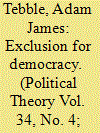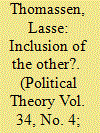| Srl | Item |
| 1 |
ID:
073491


|
|
|
| 2 |
ID:
073490


|
|
|
|
|
| Publication |
2006.
|
| Summary/Abstract |
Recent consideration of the politics of culture and identity has failed to capture an emergent trend in political practice that raises important philosophical questions for normative political theory. To rectify this, identity politics is examined in terms of two distinctions. Examining that politics in terms of the distinction between left and right, as well in terms of the distinction between normative discourse and the policies that discourse justifies, enables us to do more than account for three standard accounts of the politics of cultural turn: multiculturalism, conservative nationalism, and liberal nationalism. It also captures the newly emergent position of identity liberalism. This is a perspective that employs a progressive identity-based normative discourse typically considered to be the preserve of the multicultural left to defend a right-wing politics of assimilation.
|
|
|
|
|
|
|
|
|
|
|
|
|
|
|
|
| 3 |
ID:
073489


|
|
|
|
|
| Publication |
2006.
|
| Summary/Abstract |
In his most recent work, Jürgen Habermas has proposed a deliberative account of tolerance where the norms of tolerance-including the threshold of tolerance and the norms regulating the relationship between the tolerating and the tolerated parties-are the outcomes of deliberations among the citizens affected by the norms. He thinks that in this way, the threshold of tolerance can be rationalized and the relationship between tolerating and tolerated will rest on the symmetrical relations of public deliberations. In this essay, and inspired by Jacques Derrida's work on the concept of hospitality, I propose a deconstructive reading of Habermas's writings on tolerance. I argue that Habermas is ultimately unable to provide a rational foundation for tolerance and that his conception of tolerance encounters the same problems he is trying to avoid, namely, the contingency of the threshold of tolerance and a paternalistic relation between tolerating and tolerated. Yet, contra Habermas, the deconstruction of tolerance does not result in its destruction and does not force us to give up on the concept and practice of tolerance.
|
|
|
|
|
|
|
|
|
|
|
|
|
|
|
|
| 4 |
ID:
073492


|
|
|
| 5 |
ID:
073488


|
|
|
|
|
| Publication |
2006.
|
| Summary/Abstract |
This essay asks why Aristotle, certainly no friend to unlimited democracy, seems so much more comfortable with unconstrained rhetoric in political deliberation than current defenders of deliberative democracy. It answers this question by reconstructing and defending a distinctly Aristotelian understanding of political deliberation, one that can be pieced together out of a series of separate arguments made in the Rhetoric, the Politics, and the Nicomachean Ethics.
|
|
|
|
|
|
|
|
|
|
|
|
|
|
|
|